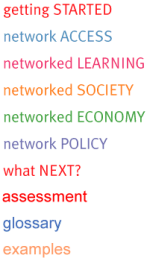|
The
results from the Readiness assessment act as the starting point in a
participatory planning dialogue. They should
heighten awareness of the opportunities and challenges of
joining the Networked World.
A
planning process should be undertaken as a true partnership among
business, government and other members of the community. The process
should encourage but not require
participation from the whole community. Participants should be key stakeholders
that might include local carriers (incumbent and competitors), ISPs,
high-tech companies, business users, appropriate government officials,
educators, universities, bankers and community groups.
Just
as the other components of Readiness have been assessed, the nature and
progress of the planning dialogue that is currently underway within the
community should also be carefully
understood. This is valuable whether a plan has already been put into
action or if there is not yet any planning underway.
|
The
following concepts should be kept in mind during the planning
dialogue:
- Communities at
lower stages of Readiness can get ideas for improvement from
the higher stage indicators. It is important to note, however,
that the path from Stage One to Stage Three does not
necessarily lead through Stage Two. Indeed, the absence of ICT
development within a particular community may present unique
opportunities for rapid ICT adoption and a
"leapfrogging" of stages of Readiness. Reaching
Stage Four does not mean a community is finished; there is a
need for continual improvement, especially in light of the
speed with which ICTs and their applications develop and
change.
- Preparing people
is at least as important as preparing the technology they will
use.
- The importance
of education in Readiness cannot be overestimated - a heavy
emphasis upon incorporating ICTs in the educational system can
yield tremendous long-term benefits by investing in the future
Readiness of the workforce, society and economy.
- Each
community must decide its own priorities and resource
allocation to get Ready, but it should
be careful not to sacrifice long-term gains for short-term
benefit.
- A close working
relationship between business and government is critical.
- ICTs
are constantly becoming more powerful and less expensive.
Applications that may be prohibitively
expensive in the present may prove to be quite affordable in
the near future.
|
<---Previous
Page Next Page -->
|
|


